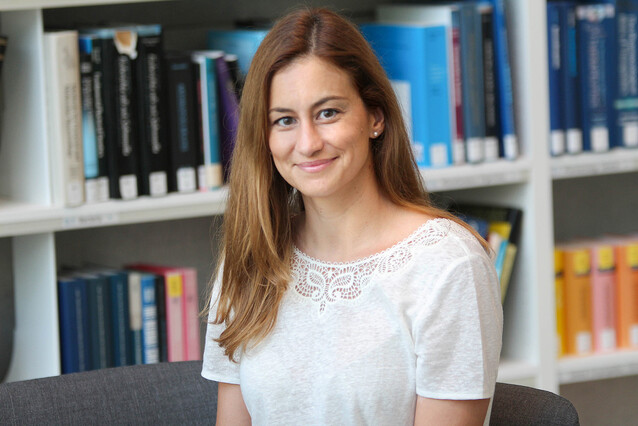Anna Obenauf wins the 2025 Dr. Josef Steiner Cancer Research Award
Anna Obenauf, senior group leader at the IMP in Vienna, has been awarded the prestigious Dr. Josef Steiner Cancer Research Award 2025. Highly prestigious in the field of cancer research, the Steiner Award recognises groundbreaking work with strong potential for clinical impact and provides long-term support for ambitious research programs. In this interview, Obenauf talks about the goals of her Steiner-funded project Decode-iTME, the challenge of therapy resistance, and how her team aims to re-empower immune cells to fight cancer.
Congratulations on receiving the Dr. Josef Steiner Cancer Research Award! What does this recognition mean to you personally and professionally?
I feel really honoured to receive this award. For many years, I have admired the Steiner Award and the amazing work of its past recipients, which has been a big source of inspiration for me. So, on a personal level, it’s definitely a milestone. But even more, I see it as recognition of the incredible team effort behind our work—students, postdocs, scientists in my lab, and our many collaborators. Their creativity and dedication have made everything possible. Professionally, the award highlights how important it is to tackle therapy resistance and immune evasion, which are still some of the biggest challenges in cancer research. And of course, the financial support gives us the freedom to go after bold, interdisciplinary ideas with real potential to make a difference for patients, which I’m really excited about.
Can you tell us about the research project that earned you this award? What are its main goals, and what inspired you to pursue this line of research?
Tumours aren’t just made up of cancer cells—they grow within a very complex environment that also includes supporting tissue, blood vessels, and immune cells. And what’s fascinating is that the cancer cells themselves can actually shape and reprogram this environment. With our project, called Decode-iTME, we’re trying to understand—and ultimately overcome—what’s known as the “immune-evasive tumour microenvironment.” Which means the tumour manages to switch off some of the key immune cells that should be fighting it.
Cancer cells can reprogram their surroundings to block immune attack. How are you approaching this challenge in your research?
In our earlier work, we found that when melanomas become resistant to targeted drugs, they also often resist immunotherapies. That happens because the cancer cells reprogram their surroundings in ways that suppress T cells, which are really the immune system’s main fighters against tumours. So, with Decode-iTME, we have two main goals: first, to map out in detail how cancer cells build and maintain this protective environment, and second, to use synthetic biology to design new strategies for boosting immune cells so they can once again recognise and destroy the cancer.
Immunotherapies and targeted therapies have transformed cancer care—we’ve come closer than ever to curing certain cancers in some groups of patients. But the truth is, most patients still don’t benefit long-term. By understanding how cancer cells orchestrate immune evasion, we hope to find ways to break that cycle and make these treatments effective for many more people. And I’m especially excited to be collaborating on this with my colleagues Alexander Stark and Johannes Zuber at the IMP, using cutting-edge technologies.
How do you envision your findings contributing to cancer treatment or prevention in the future?
Our goal is to take the detailed mechanistic insights we discover with our research and turn them into smart combination therapies and new treatment strategies. The idea is that if we can disrupt the cancer cell states that create this immune-suppressive environment, and at the same time engineer synthetic switches in immune cells, we can restore antitumor immunity right inside resistant tumours. If we succeed, this could lead to safer, more effective treatments—especially for patients who don’t currently benefit from immunotherapy.
Looking ahead, how will this award enable you and your team to take your research to the next level?
The multi-year support really gives us the chance to expand what we are doing. It means we can grow our models and patient-derived datasets, take on ambitious screening and synthetic biology projects, and invest in the latest technologies. Just as important, it allows us to strengthen training and collaboration across computational, experimental, and clinical fields. That mix is what will help us move faster—from basic discovery all the way to preclinical proof-of-concept. In the end, it’s about laying the foundation for new therapies that can improve outcomes for patients whose cancers are currently resistant to treatment.
----
This is the second time the Steiner Award has been conferred on an IMP scientist, the first recipient was Hartmut Beug in 1988.
Further reading
